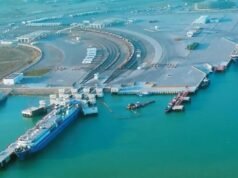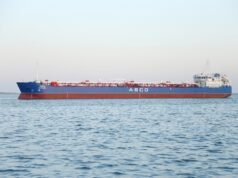Global logistics has been experiencing challenges in recent years that it has never had to face before. The complex geopolitical situation and armed conflicts on the busiest international transport routes have a significant impact on the efficiency of cargo transportation and are ultimately reflected in prices.
And here we have the global process of fragmentation, which, both on a global and regional scale, threatens to further complicate freight transport.
You don’t have to look far for examples. The previously overloaded routes through the Red Sea and Suez have almost stopped, the Panama Canal is drying up, the movement of all types of transport in the air and land space of Russia, Ukraine, Iran, and a number of Middle Eastern countries is restricted…Aliyev opened the plant in 2013. A breakthrough before our eyes
It is natural in this regard that today the attention of shippers is increasingly directed towards the South Caucasus and Central Asia, towards the “Great Silk Road” from China to Europe via the Caspian Sea, which is being revived at the initiative of Azerbaijan, better known as the “Middle Corridor” or the Trans-Caspian International Transport Route (TITR).
Despite its considerable length, TMTM is currently the safest. Its undoubted advantages also attract the attention of freight carriers. Although, due to infrastructure problems associated with the operation of automobile and rail transport, it is becoming increasingly difficult to cope with the growing volume of orders.
And there are also not enough ships delivering cargo from one shore of the Caspian Sea to the other.
It was for this purpose that on September 20, 2013, at the initiative of the President of Azerbaijan Ilham Aliyev, the Baku Shipyard was put into operation, carrying out construction, repair and marine engineering work for various purposes.
The editorial staff of haqqin.az decided to tell readers how this enterprise copes with the tasks set, for the sake of which hundreds of millions of manats were allocated from the country’s budget.


First of all, it is important to note that although the country’s leadership prepared in advance for the boom around the Trans-Caspian transport and logistics corridor, over the past ten years, for various reasons, only ten ships of various purposes have come off the slipways of the Baku Shipyard. It is clear that at such a rate, there could be no talk of competition in the Caspian Sea basin with Russian and Turkish shipbuilders.
As a result, the plant’s management had to be changed, and in 2023 a new Board of Directors was created, after which the situation began to change before our eyes.
To date, BSZ has already concluded fourteen contracts for the construction of cargo and offshore vessels. The construction deadlines are also compressed to the limit – the end of 2027 – beginning of 2028.
In 2025, the construction of 10 ships will continue simultaneously. For comparison, before the reforms, the plant spent 270 man-hours (h/h) or more to produce one ton of metal structure. To date, indicators have been achieved within 120 h/h, but the new management plans to reduce them below 120 h/h. If we turn to world practice, then in Korea this indicator is below 120 h/h, and in Turkey within 120 h/h.


It is characteristic that the more than twofold increase in the rate of shipbuilding is achieved, according to the Chairman of the Board of the Baku Shipyard Elshad Nuriyev, due to innovative approaches, optimization of production processes, competent use of labor resources, purposeful structural reform, as well as creative use of the achievements of other shipbuilders.
“It’s no secret that the basic and detailed design of ships requires a lot of time and money,” Elshad Nuriyev said as an example. “We haven’t gotten to the basic design yet, but the detailed design is completely carried out by a large creative team of professional engineers. And, by the way, no worse than foreign specialists. But how much money is saved in the end! After all, foreigners have to be paid more, and in foreign currency, and pay for accommodation… And it takes significantly less time.”
According to the Chairman of the Board of BSZ, the team of engineers and designers performs work on detailed design, creation of production drawings, technical support and testing of equipment in full compliance with the standards of the main classification societies – DNV, ABS, Lloyds Register for Shipping, BV, RMRS and the China Classification Society.
“It was these international structures that ousted the Russian Maritime Register of Shipping (Rosregistr), which had been operating in our region for many years, from the market,” noted Nuriyev.




As for training specialists, the plant has a good training base. With the help of the Ministry of Labor and Social Protection of the Population, we periodically recruit people who often have no specialty. With us, they receive high qualifications in a fairly short period of time. The quality of their training is evidenced by the fact that our specialists are often lured away by foreign companies. For example, if a welder here earns more than a thousand manats, then abroad they offer him 2-2.5 thousand euros. Of course, the management of BSZ tries to periodically raise salaries and improve the social and everyday problems of workers, but the outflow of personnel is still high – nothing can be done, good specialists are needed everywhere. And with us, of course! If today more than a thousand people work at our plant, then by the middle of next year we plan to recruit about the same number more … “
The scope of work at the Baku Shipyard is constantly growing. Among the complex projects under construction, Elshad Nuriyev names the CSD 650 dredging vessel ordered by the Baku International Sea Trade Port JSC, a Ro-Pax ferry for transporting railway cars, three passenger ships with a capacity of 50 people each, four tankers being built by order of ASCO and the State Oil Company of Azerbaijan SOCAR, a fire-fighting vessel ordered by the Ministry of Emergency Situations. For example, a tanker from Kazakhstan is currently in dry dock for repairs.
“The plant’s territory is also used for the safe delivery of huge parts for the future wind power plant in Khizi, which come from China,” Nuriyev continued. “To understand the problem of the safety of cargo of this type, it is necessary to imagine that just one blade of the future windmill reaches eighty or even a hundred meters in length. Therefore, all loading and unloading operations and storage of such complex structures were entrusted to BSZ – the most modern plant on the entire Caspian coast.


Yes, there was a time when the Azerbaijani enterprise could not even think about competing with powerful shipbuilding plants in Russia, which were ahead of the Baku Shipyard in all respects, including cost. But times have changed. Of course, the geopolitical situation has had an effect, having significantly hit the Russian shipbuilding industry . However, and this is the main thing, the Baku plant has managed to make a unique qualitative leap in a short period of time, and today is fully prepared to solve all the tasks set. The enterprise has broken into the elite of shipbuilding companies in the Caspian basin and does not intend to give up its leadership.
Currently, the annual production capacity of the enterprise is 25 thousand tons of metal construction products. Which is equivalent to the annual production of four tankers with a displacement of 15 thousand tons each, as well as four tugs or other vessels. Depending on the volume of work, there is also the possibility of repairing 80-100 ships of various purposes during the year. To date, BSZ has completed more than two hundred ship repair projects on the water, at shipyards and in dry docks.”
A creative approach to business, a well-established work mechanism and state support give every reason to assume that the team of the Baku Shipyard can reach an even higher level in all production indicators. This is confirmed not only by numerous international certificates on the walls of the enterprise’s head office, but also by modern vessels with the Made in Azerbaijan brand, plowing the expanses of the Caspian and other seas.







